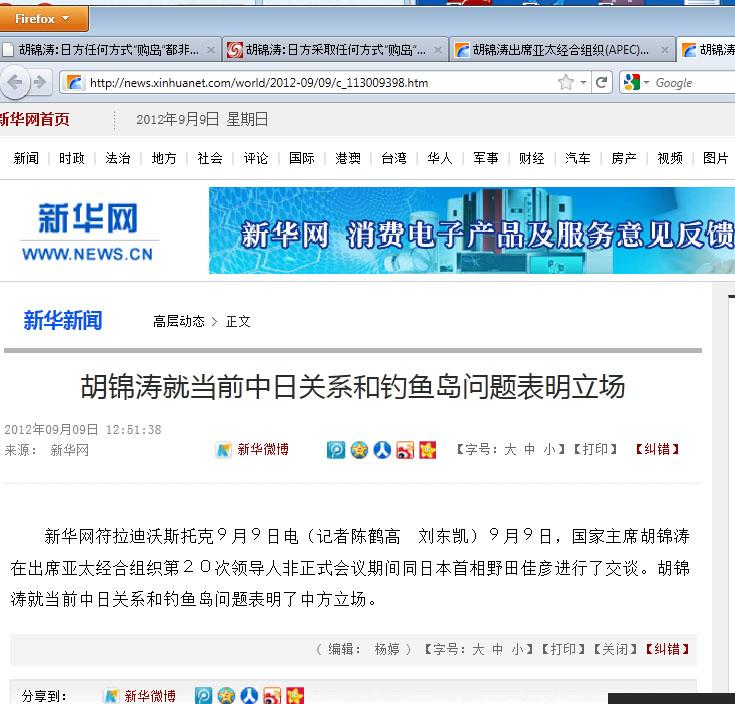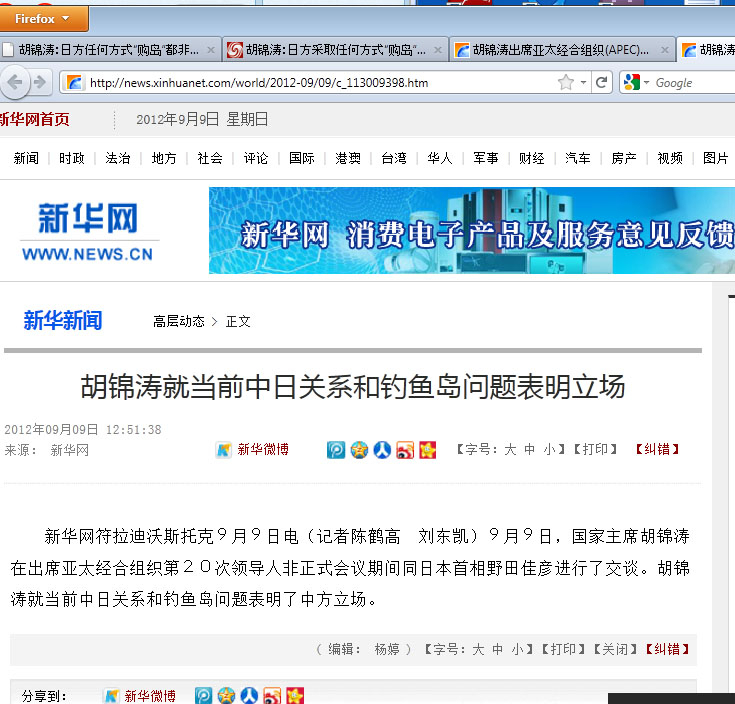Hu Jintao admonished Japanese Prime Minister Noda Yoshihiko on the sidelines of the Asia-Pacific Economic Cooperation (APEC) meeting in Russia Sunday, stating that Japan’s attempts to “interfere” in the Senkaku Islands dispute were “illegal and futile.”
Japan and China have been at odds recently over competing claims to the rocky islands in the East China Sea. They are controlled by Japan but China has recently asserted territorial claims over them.
Hu’s remarks, however, were published for less than an hour before they were purged from Party websites and others affiliated with Beijing. No explanation was presented for the deletions.
The article had said, “Hu Jintao solemnly pointed out that recently China and Japan’s conflicts over the Senkaku Islands have been grim. On the Senkaku Islands matter, the Chinese position is consistent and clear. Any means taken by Japan to ‘interfere with the islands’ are illegal, futile, and firmly opposed by China. The Chinese government’s stance on protecting territory and sovereignty is unwavering.”
The article continued, in remarks that Hu was said to have told the Japanese prime minister, that “the Japanese must fully realize the seriousness of the current situation, not make a wrong decision, and protect the development of China-Japan relations.”
By 12:30 local time on Sept. 9 the article had been scrubbed from major Chinese Web portal NetEase; a link from Google News had the headline “Hu Jintao: Any Attempts by Japan to Interfere in the Senkakus Are Futile.” However when clicking to enter the article, a message appeared and advised that it had already been deleted.
A few minutes before, Phoenix, a Hong Kong-based, Beijing-friendly television broadcaster, had not deleted the article from its website. But the original article, published by Xinhua, the state-run mouthpiece, returned an error message.
The Phoenix article was also soon cleaned up. It was amended to say simply that Hu Jintao “expressed China’s stance” on the matter—but no specifics on what that stance was.
Editor’s Note: When Chongqing’s former top cop, Wang Lijun, fled for his life to the U.S. Consulate in Chengdu on Feb. 6, he set in motion a political storm that has not subsided. The battle behind the scenes turns on what stance officials take toward the persecution of Falun Gong. The faction with bloody hands—the officials former CCP head Jiang Zemin promoted in order to carry out the persecution—is seeking to avoid accountability for their crimes and to continue the campaign. Other officials are refusing to participate in the persecution any longer. Events present a clear choice to the officials and citizens of China, as well as people around the world: either support or oppose the persecution of Falun Gong. History will record the choice each person makes.
The Epoch Times publishes in 35 countries and in 19 languages. Subscribe to our e-newsletter.
Click www.ept.ms/ccp-crisis to read about the most recent developments in the ongoing crisis within the Chinese communist regime. In this special topic, we provide readers with the necessary context to understand the situation. Get the RSS feed. Who are the Major Players?






